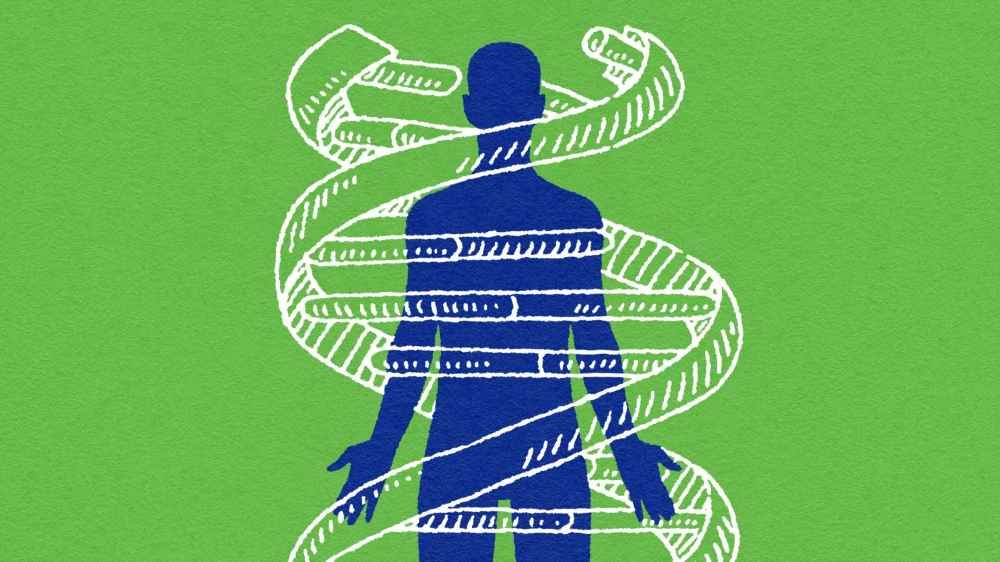
Original article from Big Think, published March 5, 2024 ~~
Genes are sometimes called the “blueprint of life,” but that doesn’t make them the behavioral playbook.
Genes are quite remarkable things. But in the last few decades, the power that we have ascribed to them has gotten a little out of hand. This has led to the rise of biological (or genetic) determinism. This is the idea that our biological makeup (as opposed to culture, environment, or personal decisions) is the dominant determinant of our behavior.
There is now a “warrior gene” legal strategy for criminal defenders advocating on behalf of persons accused of violent crimes. (One cartoon depicts an attorney rendering his client’s plea before the bench: “Not guilty by reason of genetic determinism, Your Honor.”) There is at least one company that will test your genome for a supposed “infidelity gene.” You can submit a saliva sample and find out if you (or a potential mate) have the variant of the gene and are therefore likely to cheat in a romantic relationship. All this for the low price of $149! This same company can help you discover whether thrill-seeking and risk-taking (the “wanderlust gene”) are in your DNA.
But as we have learned more and more about genetics, this notion that genes are the controlling agents of our behavior is less and less convincing. As one scientist (a biologist, no less) writes:
“Numerous commentators expect our genetic endowment to accomplish feats of which it is incapable … Statements such as ‘Understanding the genetic roots of personality will help you find yourself and relate better to others’ are, at today’s level of knowledge, frankly nonsensical.”
One of the critical things we often get wrong when we talk about this subject is this: Genes do not code for traits. They certainly don’t code for behavioral traits (such as kindness). But in the overwhelming majority of cases, genes don’t even code for physical traits (such as hair color). Some of our misconceptions about this come from grade school lessons in Mendelian genetics. You might remember learning about Gregor Mendel’s pea plants and the concepts of dominant and recessive traits. In this elementary lesson, cross-fertilizing two pea plants that have smooth peas (dominant trait) leads to a progeny of plants, where three-quarters have smooth peas (dominant) and one-quarter have wrinkled peas (recessive).
But, as we have come to find out, traits that are inherited in a simple Mendelian fashion are the exception, not the rule. In humans, they are incredibly rare. Human examples of Mendelian inheritance come from diseases (sickle cell anemia, cystic fibrosis, and Huntington’s disease, to name just a few), not normal physiology. In humans, normal traits that follow a Mendelian inheritance pattern seem to be absent. Even traits that we once thought were inherited in this simple pattern, such as eye color, are now understood to be much more complex.
What genes actually code for are proteins. Proteins are the molecular machines that build and keep our bodies running smoothly. Some proteins fight infection and are called antibodies. Others help provide structure or allow for muscle elasticity (titin). Yet others convey messages through the blood and are known as hormones. How many different types of proteins does a human have? No one knows for certain. Some experts estimate that our genes make between a few hundred thousand to several billion different types of proteins.
As our understanding of genetics has deepened, the support for genetic determinism has eroded.
Samuel T. Wilkinson
As our understanding of genetics has deepened, the support for genetic determinism has eroded. We have come to recognize that genes don’t really act as agents in themselves. They are regulated (turned on or off) by things called transcription factors. In turn, these transcription factors — and here’s the death knell for genetic determinism — are regulated by the environment. As the neuroendocrinologist Robert Sapolsky has put it, “It’s not meaningful to ask what a gene does, just what it does in a particular environment.” What does Sapolsky mean by the “environment”? It can be the environment inside the cell, just outside the cell, or in the world outside the body.
Most scientists assume that genes have some influence on our traits — both behavioral and physical — but the way this happens is extraordinarily complex and very indirect. There are very few examples in humans where a known genetic variation has quantitatively been linked to a behavioral response. Even when we do find genetic variation that can be quantitatively linked to a behavior, these estimates are very imprecise. Genes do indeed shape and influence our behavior, but they don’t determine it. In other words, there is no gene for selfishness or aggression; likewise, there is no gene for kindness or cooperation. Clearly genes play some role in our behavior. But the reality of human psychology is increasingly seen to be worlds away from a sort of genetic behavioral determinism.
